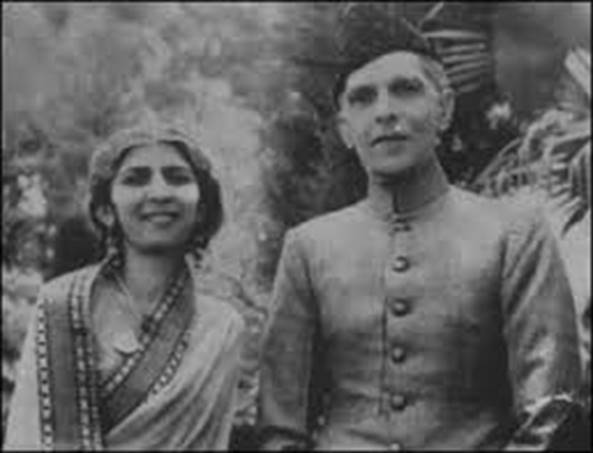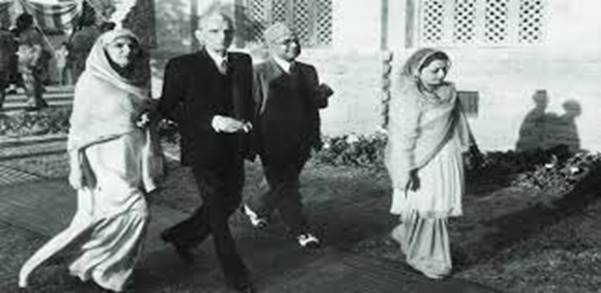
CodePen
Miss Fatima Jinnah
By Dr Asif Javed
Williamsport, PA
As one thinks of Miss Fatima Jinnah (FJ), Vijay Lakshmi Pandit’s name comes to mind. There is a temptation to compare the two. There were several similarities between them: both were sisters of the leading political figures in India; both were educated and close to their brothers; and both brothers - Nehru and Quaid - had troubled personal lives.
While Quaid’s wife had died several years before partition following a painful separation, Nehru’s wife too had endured a difficult marriage for years before succumbing to TB in 1936. Both sisters outlived their brothers. Both had a niece but neither aunt was close to her. In Vijay Lakshmi’s case, there was positive hostility between her and Indira Gandhi.
The similarities end there. After partition, as Nehru became the prime minister of the country, he chose his sister for important diplomatic assignments. QA did no such thing. While his beloved sister Fati lived with him, she essentially remained a private citizen. There is yet another difference between the two sisters: Vijay Lakshmi was involved in an affair with Dr Syed Husain. Nehru sought Gandhi’s help and poor Vijay Lakshmi was forced into a marriage with a co-religionist. FJ never married, and there was never a whiff of scandal about her. Like her esteemed brother, FJ’s character remained impeccable.
FJ continues to be revered in Pakistan for a reason. While QA, a frail, sick man was fighting a lonely battle for Pakistan, his sister, often at his side, was a pillar of strength for him. “My sister was like a bright ray of light and hope,” he once said. It seems that she just lived for him. And for this, Madar-e-Millat, as FJ was affectionately called, has deservedly earned our gratitude.
FJ led a quiet life after QA’s death. That is until she was asked to be the opposition candidate against FM Ayub Khan in 1965. Despite her age and frailty, she surprised many with her vigor and resilience. Sardar Sherbaz Mazari, has given some interesting details in his book A Journey to Disillusionment. She was reluctant to stand despite pleas from several politicians. What made her change her mind was that wily Maulana Bhashani from East Pakistan. “He pleaded with her that East Pakistan looked upon her as the symbol of democracy, and that she should not let down the people who had placed such high hopes in her,” writes Mazari. Mazari who actively supported FJ went to see her in Karachi after the election and reports:
She was a direct and forceful lady, using words sparingly. As we began discussing the election, I soon realized that she had little concept of the govt. machinery that had been unleashed against her. Having led a sheltered life, she was unaware of the hold that the bureaucracy and police had over the rural areas. Nor did she understand the nature of the feudal system…She seemed quite bitter and was of the opinion that the leading politicians had let her down.
There was a rumor that Bhashani had been bribed by Ayub through Bhutto. “I confronted Bhashani with the

The Friday Times
accusation,” writes Mazari. “He did not deny it. He said that the money (Rs 500,000) had been donated to help run his madrassas.”
FJ did lose the election but it turned out to be a hollow victory for Ayub. He resigned less than four years later although FJ did not live to see that day. Late Jamsheed Markar, a senior diplomat, writes the following in Cover Point:
There were four elements that I perceived at the time to be responsible for Ayub Khan’s downfall. The first of these was the presidential election in Pakistan, during the course of which the formidable Miss FJ, combining in a vigorous campaigning style her personal magnetism with the prevalent countrywide fatigue and discontent, achieved a close-run result.
FJ did possess some of the steely resolve of her brother. Stanley Wolpert reports a meeting between FJ and Lady Mountbatten in Jinnah of Pakistan:
Edwina Mountbatten tried to befriend Fatima, inviting her to tea and seeking to ‘steer the conversation’ on such occasions away from politics, but Fatima always returned to her favorite subject ‘and made violent attacks on Congress and the Hindu community as a whole … she is obviously convinced that the Hindu intends to subjugate and dominate the Muslim completely,’ Lady Mountbatten reported.
To her surprise, the Vicereine found FJ a tough nut to crack.
Behind a stern exterior, FJ did have a kind and generous heart. Late KH Khurshid had the singular distinction of being QA's personal secretary before partition. The future president of Azad Kashmir lacked the financial resources to study abroad. After QA's death, it was FJ who encouraged him to go to the UK for Bar-at-Law. She was the one who paid for his education abroad, and, on his return, allowed him to stay at Flagstaff House, her residence. Khurshid stayed there for years, even after he was married. The following paragraph is from his book Memories of Jinnah:
Hector Bolithos's book, Jinnah: Creator of Pakistan, is out. We were talking about it the other day. Miss Jinnah is still in the process of reading it. Her attitude is one of contempt for the author and once or twice she has expressed the idea that if there are material mis-statements and falsehoods in the book, she will consider ways of taking action against the author and the Govt. of Pakistan, the book's sponsors...I personally feel, and have told her so, that an action or suit would be unnecessary. A mere statement from her would be quite enough to destroy the purported authenticity of the work.
Bolitho spent two years writing his book and interviewed no less than 200 people, including KH Khurshid, Begum Raana Liaquat among others. Conspicuously absent from that long list is the name of FJ. Did he forget to see her? Highly unlikely. Did she refuse to see him and if so, why? One can only speculate. This is Bolitho’s narrative of FJ’s time in Bombay:
The material struggle was over. Now, he (QA) earned enough money to buy a carriage, to move to a better apartment, and to bring his sister, Fatima, from Karachi., and send her to the Bandra convent school…Bombay was a maze of caste and religious distinction, and it was therefore a brave innovation to send a young Muslim girl to a Catholic convent…the people of her community could not be reconciled to the idea. The dovecots of orthodoxy went up in flames. The innocent young Fatima became the target for wagging tongues…Miss Jinnah’s brother was at her side, ‘to give all the courage that she needed to stand up to the opposition…he used to visit her every Sunday…the relationship between brother and sister endured through the vicissitude of half a century.
While FJ’s devotion to QA is hard to question, there were indications that there was a void in QA’s personal life: he longed for marital happiness that had eluded him. “I wish that I had a son,” he said once. On another occasion, when asked to consider remarriage by Liaquat Ali Khan, he said, “Yes, I might have married again, if I could have found another Raana.” One can discern the lack of intimacy in QA’s life that only a loving spouse could provide. The following paragraph from Jinnah of Pakistan by Wolpert is also revealing:
In London, the only round table left to him was one at which he and Fatima dined alone, rarely speaking to one another and never smiling. Most evenings, except in those scarce interludes when a beautiful begum appeared, the house lights at Hampstead Heath Road remained dim.
According to Wolpert, there was no love lost between FJ and Raana Liaquat. Raana told him, “She (Fatima) hated any woman he ever liked. Oh, how she hated Ruttie! I think she must have been jealous of us all! We used to call her the wicked-witch!” Marital discord is sometime potentiated, and occasionally initiated by a third family member. Did FJ, the devoted omnipresent sister become too possessive, and contribute to the rift between QA and Ruttie? Was she the reason QA never remarried? One begins to wonder!
Years ago, in one of his columns, the late Ardsher Cowasji narrated an incident: QA’s Mausoleum was being planned. Several artists had submitted their designs. The committee, appointed by the Govt. approved one. As a courtesy, perhaps, the selected design was sent to FJ. She refused to give her approval. The second-best design, therefore, had to be chosen. That is the one that stands today on QA’s-and her own final abode.
A controversy that refuses to go away is about PM Liaquat’s visit to QA at Ziarat. Before proceeding further, it is worthwhile to remember what Jamsheed Marker writes of Liaquat:
In his profound and absolute love for Pakistan, he had abandoned vast agricultural lands in Karnal and many urban properties elsewhere in India. Above all, he gifted to the Govt. of Pakistan his splendid New Delhi residence for use as Pakistan’s High Commission in India. It may be mentioned here that, before leaving for Pakistan, Mr Jinnah sold his equally splendid bungalow to Ramkarishna Dalmia, the Marwari multimillionaire. Born and bred in the luxury of ancestral nobility, Liaquat died a virtual pauper.
What follows is Wolpert’s description of that controversy: “FJ, who had never really liked either Liaquat or his Begum, subsequently reported that after Liaquat left, Jinnah told her with trembling voice, ‘Do you know why he has come? He wants to know how serious my illness is, how long I will last.’”
Wolpert then goes on to give his own rationale for Liaquat’s visit.
It was doubtless true, yet hardly as opprobrious as Fatima considered it, under the circumstances. There was, after all, still a nation to be run—millions of displaced persons to be fed and cared for, an undeclared war in Kashmir to be fought, a constitution to be drafted, dissident Bengalis, Pathans, Punjabis, Baluchis, and Sindhis somehow to be satisfied. To Liaquat, a displaced Nawabzada from UP and Oxford, it must have seemed odd to be there in Ziarat, still, a mere ‘courtier’ to that imperious regal couple, though he was almost fifty-three.
Did FJ allow her personal dislike of PM Liaquat and his wife to color her judgment? A remark made by QA, a very sick man, who was struggling to breathe, and probably hypoxic (low oxygen in blood) might have been misunderstood or blown out of proportion. But it did malign a loyal lieutenant of QA which was most unfortunate.
Chou Enlai was once asked about the legacy of the French Revolution. “Too soon”, said the sagacious Chinese PM. Half a century after her passing, it may not be too soon, perhaps, for objective historians to reassess FJ’s legacy for posterity.
(The writer is a physician in Williamsport, PA and may be reached at asifjaved@comcast.net )

